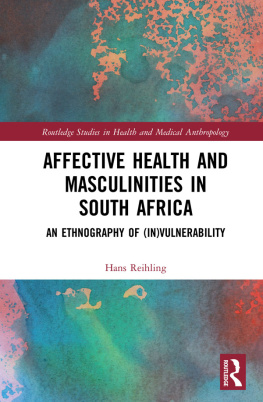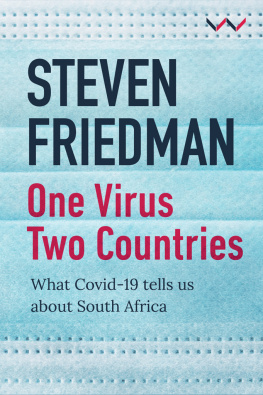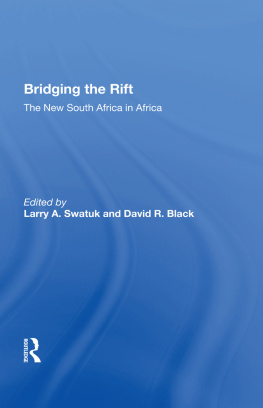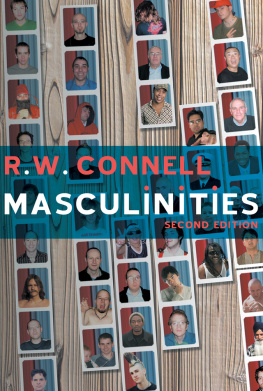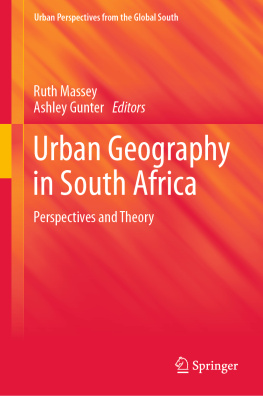Affective Health and Masculinities in South Africa
Affective Health and Masculinities in South Africa explores how different masculinities modulate substance use, interpersonal violence, suicidality, and AIDS as well as recovery cross-culturally.
With a focus on three male protagonists living in very distinct urban areas of Cape Town, this comparative ethnography shows that mens struggles to become invulnerable increase vulnerability. Through an analysis of masculinities as social assemblages, the study shows how affective health problems are tied to modern individualism rather than African tradition that has become a clich in Eurocentric gender studies. Affective health is conceptualized as a balancing act between autonomy and connectivity that after colonialism and apartheid has become compromised through the imperative of self-reliance. This book provides a rare perspective on young mens vulnerability in everyday life that may affect the reader and spark discussion about how masculinities in relationships shape physical and psychological health. Moreover, it shows how men change in the face of distress in ways that may look different than global health and gender-transformative approaches envision. Thick descriptions of actual events over the life course make the study accessible to both graduate and undergraduate students in the social sciences.
Contributing to current debates on mental health and masculinity, this volume will be of interest to scholars from various disciplines including anthropology, gender studies, African studies, psychology, and global health.
Hans Reihling, PhD, is a research affiliate in the Department of Anthropology at the University of Amsterdam as well as a couples and family therapist in private practice (www.hansreihling.com).
Routledge Studies in Health and Medical Anthropology
Depression in Kerala
Ayurveda and Mental Health Care in 21st-Century India
Claudia Lang
Diagnosis Narratives and the Healing Ritual in Western Medicine
James P. Meza
Haemophilia in Aotearoa New Zealand
Julie Park, Kathryn M. Scott, Deon York, and Michael Carnahan
The Anthropology of Epidemics
Christos Lynteris, Frdric Keck and Ann H. Kelly
Locating Zika
Social Change and Governance in an Age of Mosquito Pandemics
Edited by Kevin Bardosh
Affective Health and Masculinities in South Africa
An Ethnography of (In)vulnerability
Hans Reihling
www.routledge.com/Routledge-Studies-in-Health-and-Medical-Anthropology/book-series/RSHMA
Affective Health and Masculinities in South Africa
An Ethnography of (In)vulnerability
Hans Reihling
First published 2020
by Routledge
2 Park Square, Milton Park, Abingdon, Oxon OX14 4RN
and by Routledge
52 Vanderbilt Avenue, New York, NY 10017
Routledge is an imprint of the Taylor & Francis Group, an informa business
2020 Hans Reihling
The right of Hans Reihling to be identified as author of this work has been asserted by him in accordance with sections 77 and 78 of the Copyright, Designs and Patents Act 1988.
All rights reserved. No part of this book may be reprinted or reproduced or utilised in any form or by any electronic, mechanical, or other means, now known or hereafter invented, including photocopying and recording, or in any information storage or retrieval system, without permission in writing from the publishers.
Trademark notice: Product or corporate names may be trademarks or registered trademarks, and are used only for identification and explanation without intent to infringe.
British Library Cataloguing-in-Publication Data
A catalogue record for this book is available from the British Library
ISBN: 978-0-429-32856-5 (ebk)
ISBN: 978-0-367-34881-6 (hbk)
Typeset in Times New Roman
by Newgen Publishing UK
In memory of Thembelani, John, and Wasim
Contents
At the beginning of my research, gender activists and scholars often smiled or asked me to be very cautious when I told them about my project. Why study mens vulnerability? I was asked. From a feminist perspective, this focus may seem odd because the power of straight men who were born male over women and queer people seems to be entrenched across the globe. The #MeToo movement, in particular, shone a spotlight on high-profile cases of sexual assault against women. But this may be only one manifestation of what has been called toxic masculinity, which is associated with the devaluation of femininity, domination, homophobia, excessive competitiveness, and interpersonal violence. Global health research stresses that mens power over health-related decision-making can negatively impact women, children, and ultimately men themselves. As a result, activists have called for mens inclusion in public health and development programs to transform harmful gender norms and promote gender equality (Barker et al. 2010). Interventions are often based on a model that targets individual men and their problematic masculinity, mainly to reduce the burden of infectious disease, including HIV/AIDS, as well as intimate partner violence. Mens gender-specific vulnerability in its own respect nevertheless remains understudied, particularly in less economically developed countries and cross-culturally.
Some advocates call for the inclusion of gender-specific approaches in global health for the benefit of men themselves to address a paradox: Mens multiple advantages simply do not translate into better health outcomes (Baker and Shand 2017). Men tend to be in worse health than women globally and many of the behaviors associated with masculinity increase the risk of illness, injury, mental disorder, and premature death (Sabo and Gordon 1995; Robertson 2007; Courtenay 2011; ONeil 2015). It has been argued that feminist teachers and activists need to think creatively about how to help boys and men understand that gender creates masculine vulnerabilities (Clowes 2013). In that regard, this book provides a perspective from below that may increase cross-cultural competence and sensitivity in health education, social work, and psychotherapy. But instead of providing ready-made answers, my ethnography is meant to affect the reader, cultivate curiosity, and spark discussion.
Medical anthropologists have argued that mental health with its social and cultural determinants must be included in global health agendas (Desjarlais et al. 1995; Kleinman 2009; Kohrt and Mendenhall 2016). However, the dynamics at hand seem to be more complicated than calls for the rollout of medical and behavioral treatments in resource-poor settings around the world may suggest (Dilger and Mattes 2018). To what degree the mental in global mental health is a modern psychiatric construct for problems that are better explained in terms of political upheaval, economic disparity, and social exclusion remains a contentious issue (Summerfield 2008; Fernando 2014; Jain and Orr 2016). I asked myself: What if researchers, mental health clinicians, religious healers, and patients could agree on some basic premises about the causation of problems and their cure without losing their particular insights and without being colonized by one another? This ethnography seeks to take a step toward overcoming the dichotomies between the psychological and the social, the mind and the body, as well as local healing practices and global medical and behavioral science by focusing on what I call


